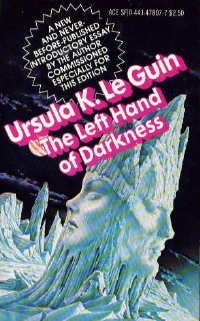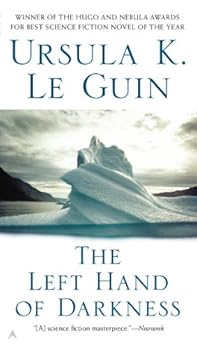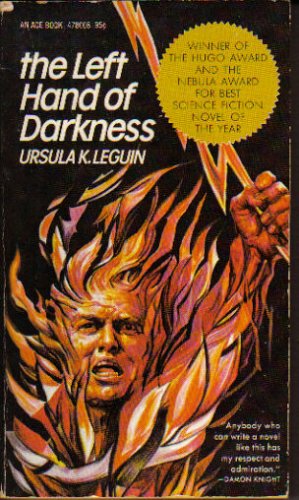![]() The Left Hand of Darkness by Ursula Le Guin
The Left Hand of Darkness by Ursula Le Guin
 The Left Hand of Darkness (1969), part of THE HAINISH CYCLE, won both the Hugo and Nebula Awards for Best SF Novel, and is well known as one of the first books in the genre to intelligently explore the nature of gender and identity. Ursula K. LeGuin is a highly respected writer known for her anthropological and humanistic approach to SF, and her presence has attracted many mainstream readers and forced literary critics to take the genre more seriously. For that alone we owe her a great debt, and she has also written a series of critical essays entitled The Language of the Night: Essays on Fantasy and Science Fiction (1979). Her other masterpieces include The Dispossessed (1974), which won the Hugo and Nebula awards, and THE EARTHSEA CYCLE of YA fantasy novels.
The Left Hand of Darkness (1969), part of THE HAINISH CYCLE, won both the Hugo and Nebula Awards for Best SF Novel, and is well known as one of the first books in the genre to intelligently explore the nature of gender and identity. Ursula K. LeGuin is a highly respected writer known for her anthropological and humanistic approach to SF, and her presence has attracted many mainstream readers and forced literary critics to take the genre more seriously. For that alone we owe her a great debt, and she has also written a series of critical essays entitled The Language of the Night: Essays on Fantasy and Science Fiction (1979). Her other masterpieces include The Dispossessed (1974), which won the Hugo and Nebula awards, and THE EARTHSEA CYCLE of YA fantasy novels.
I read The Left Hand of Darkness back in high school, and it had a profound effect on my perceptions of what intelligent SF can do. What it lacks in space battles, dazzling technologies, bizarre alien species, etc., it fully makes up by rigorously exploring what an androgynous society might be like, one in which people are neither male nor female for most of the month, except when they enter a state of kemmer, in which they become sexually active a nd seek a partner. When the Gethenians (the native human population) find a mate, one assumes male attributes and other female, but this state lasts only for a few days, so for the majority of the year Gethenians are androgynous and lack sexual urges. LeGuin’s genius is that she explores the implications of this “thought experiment” from so many angles, examining politics, war, economic development, friendship, love, loyalty, betrayal, all against the backdrop of a planet trapped in a relentless Ice Age, which also shapes the two nations of Karhide and Orgoreyn that features prominently in the story.
nd seek a partner. When the Gethenians (the native human population) find a mate, one assumes male attributes and other female, but this state lasts only for a few days, so for the majority of the year Gethenians are androgynous and lack sexual urges. LeGuin’s genius is that she explores the implications of this “thought experiment” from so many angles, examining politics, war, economic development, friendship, love, loyalty, betrayal, all against the backdrop of a planet trapped in a relentless Ice Age, which also shapes the two nations of Karhide and Orgoreyn that features prominently in the story.
The Left Hand of Darkness centers around Genly Ai, an Envoy from the Ekumen, a loosely-linked association of 85 human-inhabited worlds. Through long experience, the Ekumen has fine-tuned its approach to contacting new worlds for the first time. They initially send just a single ship, and from that ship send just a single Envoy at first. The intent is to avoid being viewed as a threat by the native peoples. So for much of the novel, Genly tries in vain to convince the peoples of Karhide and Orgoreyn that he is indeed an envoy from the stars, and not just a demented “pervert” who remains trapped in the state of kemmer as a male.
Genly soon gets caught up in the political intrigues of the nation of Karhide, a political monarchy. Karhiddish society is complicated by the concept of shifgrethor, a complex system of pride, face, honor, etc. in which great care is taken not to give direct insult to others, and to make sure that others do not lose face, which reflects badly on one’s self. This makes it difficult for individuals to speak directly to the point, which makes it hard for Genly’s story to be accepted, as many view him as mad or deluded.
 Finally, Prime Minister Estraven chooses to accept his story and entreats King Argaven to accept an alliance with the Ekumen, which promises to bring new knowledge, technologies, and trade goods. Argaven, however, is a paranoid and insecure ruler, and instead chooses to exile Estraven from his borders. Estraven flees to Orgoreyn, a highly organized and bureaucratic nation, and Genly decides that it’s not safe to stay in Karhide and makes his way to Orgoreyn as well. Initially he is welcomed by one of the ruling factions, who seem to be more receptive and try to leverage his presence to further their stratagems. Unfortunately, other factions refuse to believe his story and he is betrayed and sent to a prison work camp deep in the icy mountains. Meanwhile, Estraven has been living as a powerless exile in Orgoreyn, but Genly mistakenly views Estraven as a cold and calculating political creature. He is therefore quite surprised when it is Estraven who comes to his rescue in the prison camp.
Finally, Prime Minister Estraven chooses to accept his story and entreats King Argaven to accept an alliance with the Ekumen, which promises to bring new knowledge, technologies, and trade goods. Argaven, however, is a paranoid and insecure ruler, and instead chooses to exile Estraven from his borders. Estraven flees to Orgoreyn, a highly organized and bureaucratic nation, and Genly decides that it’s not safe to stay in Karhide and makes his way to Orgoreyn as well. Initially he is welcomed by one of the ruling factions, who seem to be more receptive and try to leverage his presence to further their stratagems. Unfortunately, other factions refuse to believe his story and he is betrayed and sent to a prison work camp deep in the icy mountains. Meanwhile, Estraven has been living as a powerless exile in Orgoreyn, but Genly mistakenly views Estraven as a cold and calculating political creature. He is therefore quite surprised when it is Estraven who comes to his rescue in the prison camp.
This brings us to the main set-piece of The Left Hand of Darkness, the perilous and brutal voyage of the two across the Gobrin Glacier to avoid Orgoreyn patrols and make their way back to Karhide, hoping to allow Genly to contact his ship for aid. This arduous slog, for which LeGuin extensively researched Arctic expeditions beforehand, forces Genly and Estraven to spend several months in extremely close contact, as they are completely cut off from all other civilization and must depend on each other for survival. Of course it is Genly the off-worlder who must depend on the expertise and iron-will of Estraven, whom he previously distrusted, to get through this ordeal. LeGuin’s description of the sled journey, the minimal rations they share, the brutal sub-zero conditions and their effects on the bodies, minds, and spirits of the two is brilliantly detailed and convincing. You will feel as if you have been subjected to an Arctic journey and your hands may get frostbite just from clutching the book (there is no audiobook currently available, but I guess your ears would freeze instead).
It is during this journey that Genly and Estraven are forced to understand the nature of the other. And it is Genly who has must struggle the most, as he has unconsciously tried to look at Estraven as a man for the sake of convenience, and begins to understand that Gethenians have both masculine and feminine traits, and that they are not in conflict. He begins to understand that Estraven is a steadfast friend, and I really credit LeGuin for avoiding the tempting pitfall of having the two characters have a sexual relationship. Their bond becomes deep but transcends gender.
This must have been a profound insight when The Left Hand of Darkness was first published in 1969, at the height of a social revolution and as the feminist and women’s movements were forming. Perhaps it is more accepted nowadays that we all have male and female aspects to our personalities, and the LGBTQ+ movement has gained a lot of hard-won acceptance in recent years in parts of the world. But there are still plenty of resisters who yearn for a world of manly men and feminine women, and they will fight to maintain this world view at all costs. It’s an interesting study to apply the lessons of this book in today’s world.
When Genly and Estraven finally reach their destination, an unexpected and tragic twist changes the political climates of both Karhide and Orgoreyn and makes it possible for these two nations to accept the offer to join the Ekumen. It is a powerful ending that will linger in the reader’s mind for some time. It reduced me to tears when I first read it 20 years ago, and I don’t do that often.
 So what are the implications of a genderless society? It is a testament to LeGuin’s storytelling that The Left Hand of Darkness manages to explore this without sacrificing readability. The most obvious aspect of Gethen’s nations is that they do not wage war on each other, though there are frequent small-scale skirmishes, intrigues, assassinations, and murders on an individual level. The lack of male aggressiveness precludes them from organized military conflicts. This seems a fair assertion to make: what major human society has ever had a military dominated by women, and urges to physical violence tend to occur more among men (anyone care to deny that?). Yet LeGuin doesn’t sugar-coat her androgynous society — there are still murders, jealousy, betrayals, etc. In addition, she also posits that Gethenian society is much less proactive in pursuing scientific progress, as it has been content in many cases to maintain primitive institutions and has lacked the motivation to innovate. Is the urge to innovate and invent something mainly found in men and not women? Or is that more a product of our societies’ preconceived gender roles? I have often wondered what an all-female society would be like, whether it could achieve the same level of technological achievement as ours. Honestly, I don’t know what form it would take, but it would almost certainly be different from what we have.
So what are the implications of a genderless society? It is a testament to LeGuin’s storytelling that The Left Hand of Darkness manages to explore this without sacrificing readability. The most obvious aspect of Gethen’s nations is that they do not wage war on each other, though there are frequent small-scale skirmishes, intrigues, assassinations, and murders on an individual level. The lack of male aggressiveness precludes them from organized military conflicts. This seems a fair assertion to make: what major human society has ever had a military dominated by women, and urges to physical violence tend to occur more among men (anyone care to deny that?). Yet LeGuin doesn’t sugar-coat her androgynous society — there are still murders, jealousy, betrayals, etc. In addition, she also posits that Gethenian society is much less proactive in pursuing scientific progress, as it has been content in many cases to maintain primitive institutions and has lacked the motivation to innovate. Is the urge to innovate and invent something mainly found in men and not women? Or is that more a product of our societies’ preconceived gender roles? I have often wondered what an all-female society would be like, whether it could achieve the same level of technological achievement as ours. Honestly, I don’t know what form it would take, but it would almost certainly be different from what we have.
But I think that LeGuin’s thinking, which some consider feminist, is much more subtle than that. She seeks to examine what kind of society would develop in the absence of genders. How would our energies be refocused if we didn’t have to worry and obsess about the opposite sex all the time? How would individuals treat each other in the absence of the dualistic world of men (hunters/gatherers/fighters) and women (child-bearers/nurturers/home-makers)? Would society be more egalitarian, with merit accruing to those with greater accomplishments without the clouding influence of gender?
 The societies of Karhide and Orgoreyn provide tantalizing hints, but their strengths and flaws are on full display. They are not feminist utopias by any stretch. In fact, I would argue that The Left Hand of Darkness is not really feminist fiction as it normally understood, designed to empower women by showing their positive aspects and the negative aspects of male-dominated societies. Instead, I view LeGuin is a humanist, determined to drill down to the roots of gender identity, and by stripping this away, hoping to reveal the core elements of humanity common to both men and women.
The societies of Karhide and Orgoreyn provide tantalizing hints, but their strengths and flaws are on full display. They are not feminist utopias by any stretch. In fact, I would argue that The Left Hand of Darkness is not really feminist fiction as it normally understood, designed to empower women by showing their positive aspects and the negative aspects of male-dominated societies. Instead, I view LeGuin is a humanist, determined to drill down to the roots of gender identity, and by stripping this away, hoping to reveal the core elements of humanity common to both men and women.
~Stuart Starosta
![]() Despite a few slow spots (such as a long icy trek through a glacial landscape), this is a fascinating and thought-provoking work of science fiction that was ahead of its time. The audio edition by Recorded Books, read by George Guidall, is wonderful.
Despite a few slow spots (such as a long icy trek through a glacial landscape), this is a fascinating and thought-provoking work of science fiction that was ahead of its time. The audio edition by Recorded Books, read by George Guidall, is wonderful.
~Kat Hooper












I loved the way she took a look at this multi-layered and serious question and still provided a great, suspenseful story. She’s a master.
This had been on the TBR pile for far too long. I really must move it closer to the top.
For me, the book didn’t really become interesting until Estraven and Genly travel across the glacier. The way LeGuin turned her focus to just those two individuals and their relationship was just spectacular, but I was less impressed with the political machinations leading up to their trek.
I loved the glacier too, but I enjoyed the political machinations. I used to work for county government, so, reprehensible as is it, I did develop a taste for politics as a spectator sport.
Strangely enough, I actually liked the initial parts of the story set in Karhide and Orgoreyn more than the glacier crossing, since it depicted the wider world of Gethen and the different layers that Gethenian politics operated on. Orgoreyn with its innocuous exterior surfaces covering hidden agendas and bureaucratic intricacies reminded me somewhat of the Japanese corporate world (or perhaps any organization).
The journey across the ice was harrowing and its focus on the relationship between Genly and Estraven was at times a bit exhausting, but it certainly paid off in the end.